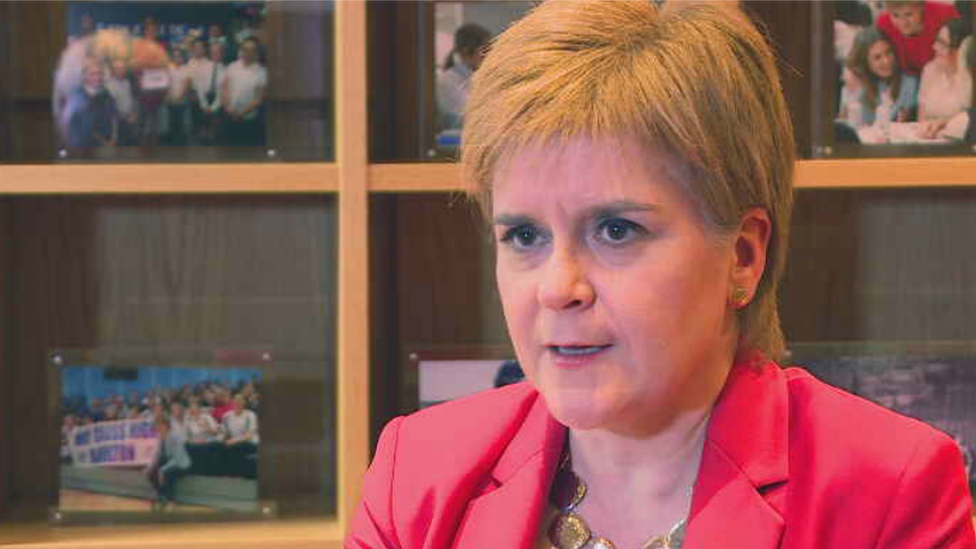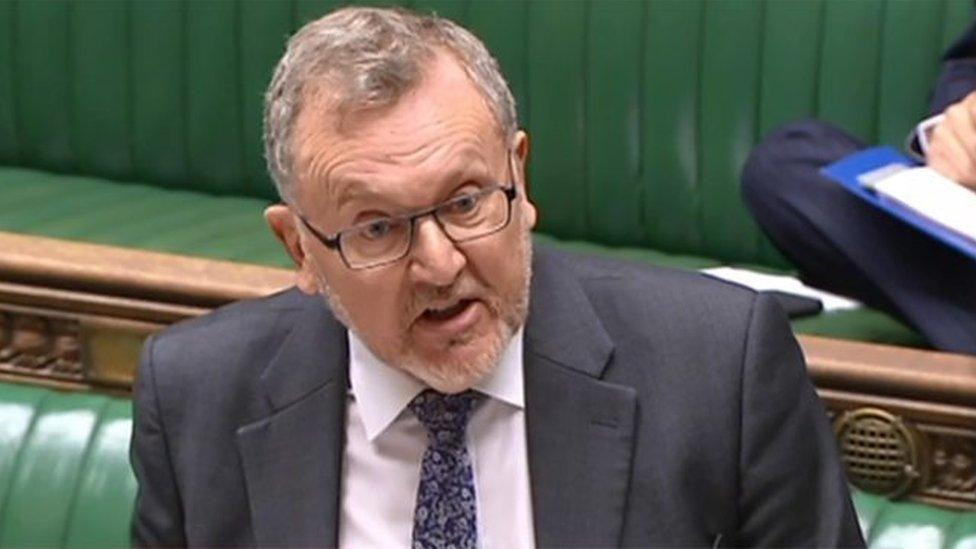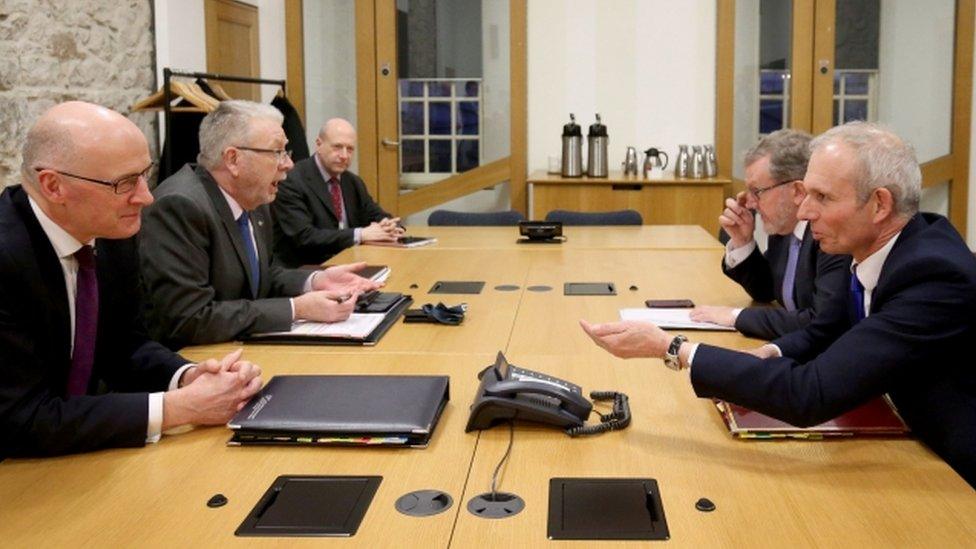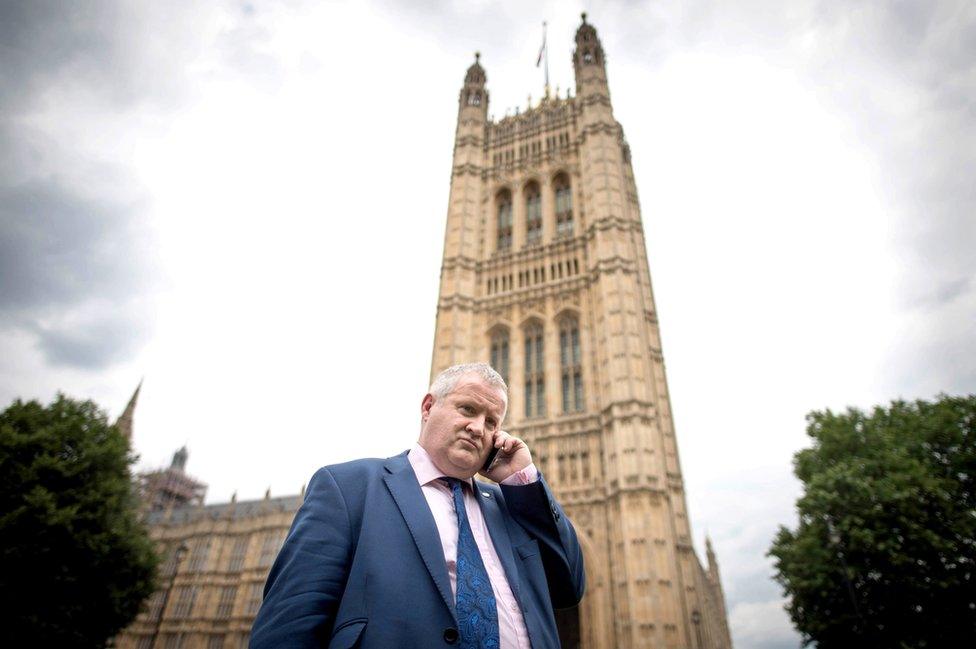A new chapter?
- Published

Nicola Sturgeon said Scotland had been treated "with utter contempt" by the Westminster system
As is her wont, Nicola Sturgeon remained decidedly calm during her interview with me this afternoon. That, despite the fact that the exchange was designed to build upon dramatic events in the Commons where the SNP group walked out following the temporary expulsion of their leader, Ian Blackford.
In similar fashion, the first minister stressed during an interview with me at the SNP conference in Aberdeen last Friday that she had no intention of using "apocalyptic" language about the Brexit dispute with the UK government.
There are two core reasons for this. One, in contrast with other politicians including some in her own party, Ms Sturgeon does calm. She seldom gives the impression these days of one whose scone has been pinched.
Two, the impact of rhetoric, apocalyptic or otherwise, is strictly limited. Ms Sturgeon knows that. She knows further that the quiet majority in the public tend to deprecate gestures. They will not take to the streets - too chilly, too time-consuming - but they may tut. If pressed, there may be a weary shake of the head.
In this particular case, Ms Sturgeon knows further that there are limits to what can be achieved by a policy of declining to co-operate with the Westminster government and Parliament. The tutting public will query, the SNPs' rivals will jeer and jibe.
Stormy times ahead
But the absence of apocalypse now does not mean that nothing will be done. Quite the reverse. Ms Sturgeon and her Brexit minister Mike Russell say they will examine further ways to pursue their case with the UK government.
The FM told me that it cannot simply be "business as usual".
There is, of course, another element to this controversy, that of electoral politics. Keith Brown, Scotland's economy secretary, told Holyrood that the SNP had gained 1,000 members this afternoon in the aftermath of the row.
Nicola Sturgeon told me she had been bombarded with supportive comments on social media - and not just from enthusiasts for independence. It is likely that the SNP will respond with messages highlighting the controversy to potential supporters.

David Mundell will make a Commons statement on the row
Meanwhile, on the other side of the argument, the Scottish Secretary David Mundell had been scheduled to give evidence to a Holyrood committee tomorrow on aspects of Brexit affecting justice.
With deep irony, he has had to postpone the session - because he is now due to deliver a statement in the Commons setting out the UK Government's thinking on this row.
Mr Mundell, it is expected, will argue that he has made every effort to reach a compromise on the issue of Holyrood powers, post Brexit. He will note that a deal has been made with the devolved administration in Wales.
He will accuse the SNP of gesture politics - and will restate his determination to continue to work with the Scottish government, regardless of the current row, to establish frameworks with regard to the future operation of regulations affecting issues like farming across the UK.
What is this row about? At base, it is about who sets the rules regarding devolved issues such as the environment once the UK has left the EU. In essence, this is replicating post Brexit the pan-EU regulations.
But it is also about who might determine the regulations on, for example, food labelling and standards in global trade - once Brexit has happened.
This could be crucial. Some suspect that the real core of this row is a desire by Westminster to maintain control over such trade talks. Some also suspect that Westminster might not want devolved obstacles to achieving such deals with, for instance, the USA where standards are already different from those pertaining in the EU.
Mr Mundell is adamant that the aim is consistency and certainty for business. He says it is vital to protect the multi-billion pound pan-UK market, on exit from the EU. No power grab. Merely common sense.
Certain powers would be retained at Westminster for a period of up to seven years while UK frameworks were determined, in consultation with the devolved governments. Those same devolved governments say they want more than consultation: they want the power to grant or withhold consent.

Hours of talks between Scottish and UK ministers have failed to yield an agreement
But the effort to cajole, the effort to appear emollient and consensual has been somewhat undermined by events at Westminster. Or, more bluntly, the UK government's handling of the Bill has provided an opportunity to their SNP rivals.
I strongly suspect Mr Mundell knows that. He knows it was intended that amendments to the Withdrawal Bill would be tabled in the Commons, not the Lords. He knows it was intended that there would be substantial consideration in the Commons of those Lords amendments.
An own goal?
For a range of reasons, these things did not happen. In particular, there was strictly limited debate yesterday: just 15 minutes, with one speech - that of David Lidington.
Mr Mundell protests that Mr Lidington took several interventions. He partly blames Labour for focusing on other matters, limiting the time for the Scottish question.
I also suspect he is aware that these points will scarcely ameliorate the situation. He knows, he knows, that it is up to government to seek to influence the Commons, through the usual channels of discussions with other parties.
Of course, there was a range of critically important issues arising from the Lords amendments. The customs union. The question of a further "meaningful" vote in the Commons on the terms of the deal.
But, even given that, the Commons should have found a way to have a substantive debate on the question of Scottish powers - that is, if the issue really mattered to the UK government, as they insisted it did.

Ian Blackford found plenty to talk ab out outside the Commons chamber
Did Ian Blackford provoke his expulsion? Partly, although the initial uncertainty from the chair assisted his position. Even as the Speaker insisted that he was in complete command of matters, he could be seen urgently consulting his Clerk.
Are the SNP making political capital out of this? Of course they are. Welcome to Scottish politics.
But is there a genuine dispute at the core of this? There is, as witness the fact that Labour, the Liberal Democrats and the Greens have been prepared to back the SNP on the issue at Holyrood.
Have the UK government contributed to the creation of a new constitutional row? Friends, they have.